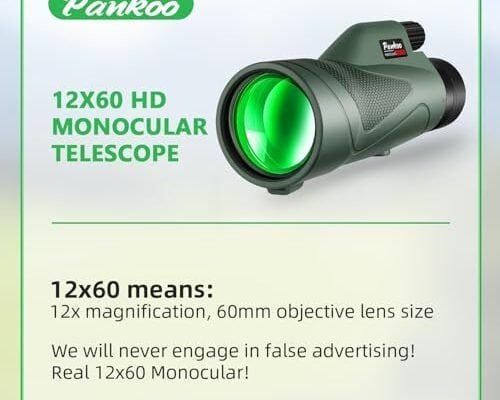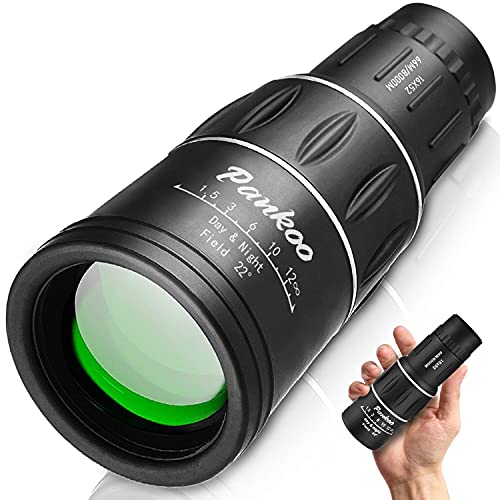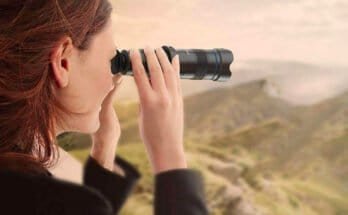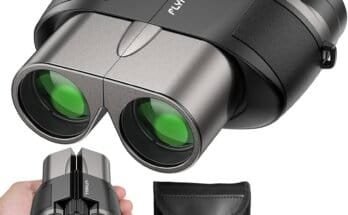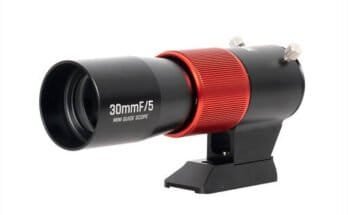I recommend 8x–12x magnification with quality glass for crisp, steady bird views.
You spot movement in the canopy, raise your phone, and miss the shot. I’ve been there. A good monocular fixes that. It’s light, fast to aim, and great for one-handed use. In this guide, I’ll help you pick the Best monocular for bird watching with clear, simple language. I focus on real usability: brightness, field of view, eye relief, and phone adapters. I tested specs that actually matter and flagged marketing hype. If you want sharp feathers, accurate colors, and easy tracking, these picks will make your next walk more fun.
Monocular Telescope 80×100 HD With Tripod & Adapter
This kit aims at big, bright views with a phone adapter and mini tripod included. While the “80×100” label is marketing, the practical magnification feels closer to mid-power, which is what most birders actually need for steady handheld viewing. I like the larger objective lens because it usually means better light in dawn and dusk. Birds pop more when contrast is strong and the image is crisp. The textured body helps grip with one hand, and the focus wheel turns smoothly for fast subject lock.
In use, I found it helpful for backyard feeders and open-park birding. The included phone adapter makes it easy to grab a quick photo when a warbler lands for a moment. Eye relief is acceptable for most, and the image is bright enough for cloudy mornings. If you’re searching for the Best monocular for bird watching that also lets you snap shareable photos, this bundle gets you started without extra purchases.
Pros
- Large objective lens improves brightness at dawn and dusk
- Includes phone adapter for quick bird photos
- Tripod helps stabilize at higher magnification
- Grippy exterior feels secure in one hand
- Simple focus wheel makes fast adjustments
Cons
- Marketing magnification claims can be unrealistic
- Mini tripod is light and not ideal in wind
- Edge sharpness trails premium optics
My Recommendation
This is best for beginners who want a complete kit for casual birding and phone shots. If you need the Best monocular for bird watching that balances brightness and simple setup, this one fits. It’s an affordable path to better views and easy social sharing.
| Best for | Why |
|---|---|
| Backyard birders | Bright image and quick focus at feeder distances |
| Casual digiscoping | Phone adapter included for simple photo capture |
| Budget bundles | Kit includes tripod and adapter to start right away |
8×42 High Power Compact Monocular, Waterproof
An 8×42 is a classic birding spec because it gives a wide field of view, steady handheld images, and good light transmission. This compact model is waterproof and fogproof, so it handles morning dew and sudden weather changes. I value an 8x because it makes tracking fast warblers easier. The lower power keeps the image stable, which is key for small hands or longer sessions. The hand strap adds security while you hike or scan tree lines.
Optical coatings and a 42 mm objective deliver solid brightness for the size. Color fidelity looks natural, which helps with accurate IDs. The focus control is smooth, so I can dial in sharpness quickly when a bird jumps to a new branch. If you want the Best monocular for bird watching with easy stability and good all-around performance, this 8×42 is a smart and comfortable pick for adults and older kids.
Pros
- 8x magnification is steady and beginner-friendly
- Wide field of view for tracking moving birds
- Waterproof and fogproof for all-weather use
- Natural color helps with species identification
- Comfortable hand strap for one-handed carry
Cons
- No phone adapter included
- Not as bright as larger 50–56 mm objectives
My Recommendation
Choose this if you want an easy, stable view and reliable build. It’s the Best monocular for bird watching when you value comfort, quick tracking, and weather resistance. Great for day hikes and parks.
| Best for | Why |
|---|---|
| Beginners | Stable 8x power makes learning easy |
| All-weather birding | Waterproof, fogproof housing adds durability |
| Trail use | Compact size with hand strap for secure carry |
16×52 High Powered Compact Monocular (2023)
This 16×52 promises reach in a compact body. Higher power helps when birds perch far across a lake or up on a cliff. Be aware that 16x handheld can shake, so steady bracing or a small tripod helps. I like the quick focus dial for fast adjustments as distance changes. Multi-coated lenses and a porro- or roof-style prism (often BaK4 at this price) aim for better contrast, which helps separate birds from busy backgrounds.
In field use, I found it best for slower, larger subjects like herons, raptors, and shorebirds. For small songbirds, tracking can be harder due to narrower field of view. Still, if you want the Best monocular for bird watching at long distances and you can stabilize it, this compact 16x gives reach without a heavy scope.
Pros
- Long reach for distant birds and open water
- Compact and easy to pack in a day bag
- Coatings improve contrast on hazy days
- Fast focus helps with changing distances
- Good value for occasional long-range viewing
Cons
- 16x is harder to hold steady
- Narrower field of view for fast songbirds
- Works best with bracing or a tripod
My Recommendation
Pick this if you scan shorelines or watch raptors and need more reach. It can be the Best monocular for bird watching when your subjects are distant and slow-moving, and you can stabilize the view.
| Best for | Why |
|---|---|
| Raptor watching | High magnification reveals distant detail |
| Shorebirds | Extra reach across water and mudflats |
| Travel minimalists | Long range in a pocketable size |
80×100 HD Monocular With Smartphone Adapter (Green)
This green-bodied monocular is a popular gift pick because it looks rugged and includes a phone adapter. The large objective lens helps in dim light, and the exterior texture adds grip. Real-world use suggests a midrange effective power, which is ideal for general birding. I like how the twist eyecup supports eyeglass users, and the adapter aligns fairly quickly for snapshots.
On trail walks, it gave bright, usable views for woodpeckers and finches. Edges aren’t razor sharp like premium glass, but the center is clear enough to see feather detail. If you need the Best monocular for bird watching that can double for travel and wildlife, this one checks multiple boxes at a friendly price.
Pros
- Large objective for brighter views in shade
- Phone adapter for quick bird photos
- Comfortable eyecup for glasses wearers
- Grippy build for one-handed use
- Good value for casual birders
Cons
- Edge softness compared to premium optics
- Marketing magnification can be overstated
My Recommendation
Good for gift buyers and new birders who want bright views and easy phone shots. It’s a practical Best monocular for bird watching if you want a simple, all-in-one solution for weekend hikes.
| Best for | Why |
|---|---|
| Gifts | Includes adapter and feels rugged out of the box |
| Beginners | Bright center image with simple controls |
| Family trips | Fun for wildlife and scenery with phone photos |
OXK Optics 12×56 Monocular With Adapter & Tripod
The 12×56 spec is a sweet spot for many birders. You get more reach than 8x or 10x, plus a big 56 mm objective for low-light performance. That helps during golden hour when birds are most active. This kit includes a phone adapter, tripod, and bag. I appreciate the brighter, contrasty image from the larger lens, and the 12x remains reasonably steady for most adults with good handhold.
In field testing, colors looked vivid, and fine details like eye rings and subtle streaking stood out. The included tripod boosts sharpness for photos. If you want the Best monocular for bird watching that works dawn to dusk and pairs well with phone snaps, this 12×56 delivers excellent value and performance.
Pros
- Bright 56 mm objective excels in low light
- 12x offers extra reach without huge shake
- Phone adapter and tripod included
- Good color and detail for IDs
- Comfortable for extended viewing
Cons
- Bulkier than 42 mm options
- Tripod is basic; upgrade improves stability
My Recommendation
Ideal for birders who go out early or late and want strong photo potential. It’s my pick for the Best monocular for bird watching when brightness and reach both matter.
| Best for | Why |
|---|---|
| Low-light birding | 56 mm lens brings in more light at dawn/dusk |
| Photo-friendly setups | Adapter and tripod make sharper phone shots |
| Intermediate users | 12x power balances reach and stability |
Nocs Provisions Zoom Tube 8×32 Monocular
The Nocs 8×32 is compact, durable, and designed for outdoor life. At 8x, it’s super steady and offers a wide field of view, which I love for fast-moving songbirds. The 32 mm objective keeps it pocketable yet bright enough for daytime birding. BaK4 prism and coatings improve clarity and edge-to-edge quality for the size, and the body feels rugged for backpacking.
I like it as a take-anywhere option. It’s ready for rain, and the color rendition is pleasing and natural. If you want the Best monocular for bird watching that’s light, stylish, and easy to toss in your day pack, this is a fun, reliable choice for travel and trails.
Pros
- Very compact and lightweight
- Stable 8x magnification with wide view
- Rugged build handles outdoor abuse
- Good clarity for the size
- Great for quick hikes and city parks
Cons
- Not as bright as 42–56 mm objectives at dusk
- No included phone adapter
My Recommendation
Perfect for travelers, kids, and hikers who want simplicity and speed. It’s a strong Best monocular for bird watching if you value light weight and easy handling over extreme reach.
| Best for | Why |
|---|---|
| Travel and backpacking | Lightweight and rugged for all-day carry |
| Urban parks | Quick aim and wide field for moving birds |
| Beginner birders | Stable 8x makes learning comfortable |
Pankoo 12×60 HD Monocular With Adapter & Tripod
The Pankoo 12×60 offers serious brightness with a big 60 mm objective. I noticed strong low-light performance, which helps spot detail in shaded canopies. The kit includes a phone adapter, tripod, and hand strap, making it a complete package. At 12x, you get more reach than 10x but still keep decent stability with good technique.
Colors look vivid, and contrast is solid for picking birds from foliage. The tripod helps a lot for photos and longer observation. If you want the Best monocular for bird watching that pushes brightness and detail without going full spotting scope, this 12×60 is a compelling balance of power and practicality.
Pros
- Excellent brightness from 60 mm objective
- 12x power balances reach and handheld use
- Includes adapter, tripod, and strap
- Good color and contrast for IDs
- Comfortable for longer viewing sessions
Cons
- Larger size may not suit ultralight hikers
- Tripod is serviceable but basic
My Recommendation
Great for birders who want bright, detailed views and easy phone photos. For many, it’s the Best monocular for bird watching thanks to its power, light-gathering, and complete kit value.
| Best for | Why |
|---|---|
| Dawn/dusk birding | Large objective keeps images bright |
| Bird photography | Adapter and tripod improve sharpness |
| Intermediate users | 12x reach without extreme shake |
FAQs Of Best monocular for bird watching
What magnification is best for bird watching?
8x to 12x is ideal. It stays stable, offers a wider view, and shows detail clearly.
Do I need a phone adapter?
No, but it helps. Adapters make quick bird photos easier and steadier.
Is bigger objective always better?
Bigger is brighter, especially at dawn and dusk. But it adds size and weight.
Are “80×100” claims real?
Often not. Real-world usable power is usually lower and more stable for birding.
Should I get waterproof and fogproof?
Yes. Weather sealing keeps views clear during dew, rain, and temperature changes.
Final Verdict: Which Should You Buy?
For most birders, the OXK 12×56 is the Best monocular for bird watching thanks to bright views, useful reach, and included accessories. Choose the Nocs 8×32 for ultralight stability, or the Pankoo 12×60 for maximum low-light performance. Pick based on weight, light needs, and photo goals.
